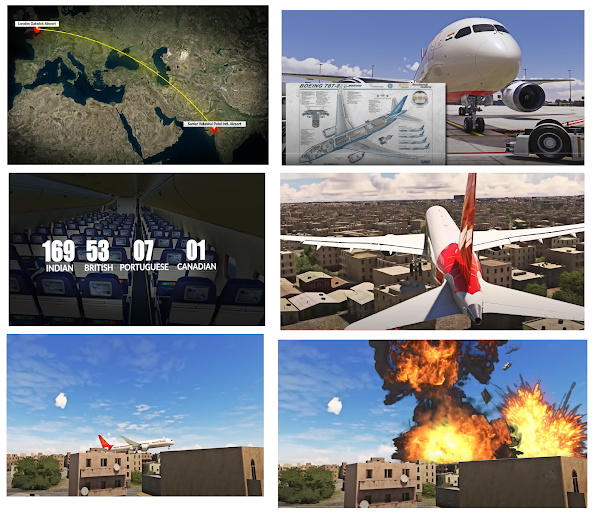Airplane Crash in India:
On 12-JUN-2025, airplane crash in Ahmedabad:
The tragic aircraft tragedy claimed the lives of all 241 passengers and crew members on board a passenger airliner that was on its route from Ahmedabad, India, to London. The occurrence has shocked people all around the world and brought up serious issues regarding emergency procedures, aviation safety, and the potential causes of the catastrophe.
Within a minute of taking off, Air India Flight AI171, a Boeing 787-8 Dreamliner that was traveling from Ahmedabad to Gatwick Airport in London, crashed. The collision happened in Ahmedabad's crowded Meghani Nagar neighborhood. There were 242 people on the flight: 230 passengers, 2 pilots, and 10 staff members. Passengers and young medical students from Meghani Nagar, Ahmedabad, are among the dead. Their premature passing has been seen as a significant loss for their families as well as for the future of the country.
(230 passengers, 2 pilots, and 10 cabin crew members)
It marks the first time a 787-8 Dreamliner has suffered a fatal crash since it entered commercial service in 2011. The 787-8 Dreamliner was flown by Captain Sumeet Sabharwal and his co-pilot, Clive Kundar. The two were highly experienced, with Mr Sabharwal reportedly having earned more than 22 years of expertise as a commercial airline pilot and over 8,000 flying hours. Almost immediately after take-off the cockpit gave a mayday call, India's aviation regulator said. No response was given by the aircraft after that. It's unclear what prompted the mayday call, but the flight's sole survivor has told Indian media that he heard a loud bang as the plane struggled to gain altitude.
Boeing crashes history:
The issues started in early 2013
when two Japanese carriers' Dreamliners caught fire. One plane was just
departing Japan and had to turn around and land, while the other had just
touched down at Logan Airport in Boston. The cause of both fires was determined
to be the overheating of the lithium-ion batteries that supply power to the
aircraft's electrical system. Rapid action was taken by the Federal Aviation
Administration (FAA), which grounded the Dreamliners' global fleet and
temporarily stopped delivering new ones to airlines that had ordered them. Boeing's improvements, which included
improved battery insulation and a stainless steel box to contain the batteries
and keep smoke or flames from entering into the aircraft in the case of a fire,
were approved by the FAA in April 2013. Within weeks of the FAA's ruling, the
Dreamliners were given the all-clear to fly and the business was permitted to
start delivering again.
The next incident happened in
2019 when John Barnett, a former quality manager who retired in 2017, disclosed
that he had filed a whistleblower complaint alleging careless work around the
wires connecting the planes’ flight control systems, with metal shavings left
behind when bolts were fastened. This was covered by The New York Times in an
exposé at the time. There was a chance
that the shavings would pierce the insulation of the wires, with
"catastrophic" results, as Barnett described them.
Additionally, Barnett said that 787s were being fitted with faulty or damaged parts, such as a dented hydraulic tube that a senior management had taken out of a bag that was meant to hold scrap. According to the Times, the FAA examined a number of 787s that were purportedly free of the shavings Barnett identified and discovered that they were in fact there. Before the aircraft were delivered to customers, the FAA then mandated that Boeing fix the issues.
Barnett filed a lawsuit against Boeing after he retired, claiming that the firm had slanded him and prevented him from advancing in his career while he was working there. Boeing disputes these claims. When he was discovered dead in his truck in March 2024 from a self-inflicted gunshot wound, he was working on his case in North Charleston, South Carolina, which was the location of the plant Where he was employed.In a wrongful death case, Barnett's family stated that "Boeing may not have pulled the trigger, but Boeing's conduct was the clear cause."
Boeing avoided the accusation by
stating in a statement that it was "sadened by John Barnett's death and
send our condolences to his family."
Other than Barnett's passing, last year was a poor year for Boeing and the
Dreamliner. Another whistleblower, engineer Sam Salehpour, came out in January,
claiming that parts of the Dreamliner's fuselage were not correctly joined,
leaving gaps that may have caused the aircraft to fragment while in flight.
Salehpour said that workers would use physical force when the parts didn't fit.Salehpour testified on Capitol
Hill, saying, "I literally saw people jumping on the pieces of the
airplane to get them to align." Jumping up and down causes pieces to
distort, temporarily aligning the holes. The Tarzan effect is what I dubbed it.
Boeing defended the Dreamliner's integrity in a statement posted on its website: "With FAA oversight, our engineers are conducting a thorough analysis to determine any long-term inspection and maintenance required, and based on comprehensive analysis, no safety issues have been identified related to composite gap management for the in-service fleet."
The FAA took further action in
May, however, declaring that Boeing was required to conduct a new inspection of
"all 787 airplanes still within the production system and must also create
a plan to address the in-service fleet." The government had already taken
efforts to address the issue of intolerable gaps in the Dreamliner's fuselage.
The FAA stopped delivering new Dreamliners to airline clients between May 2021
and August 2022 in order to address the issue. As Salehpour testified,
deliveries did resume, but the subpar work on the manufacturing floor also did.



No comments:
Post a Comment